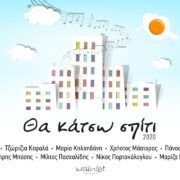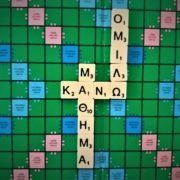How To Use Greek Proverbs in Everyday Conversations?
Proverbs are popular sayings that provide nuggets of wisdom.
Every culture and language has a collection of those. They illustrate how people within this culture think and are often influenced by its history.
The Greek word for ‘proverbs’ is ‘οι παροιμίες’.
Οι παροιμίες είναι σύντομες εκφράσεις που περιέχουν συμπυκνωμένη τη λαϊκή σοφία ενός λαού.
Κάθε κουλτούρα και γλώσσα έχει μερικές. Οι παροιμίες μας δείχνουν πώς σκέφτεται ένας λαός, ενώ συχνά σχετίζονται και με την ιστορία του.
So, get ready and learn 35 popular Greek proverbs,
which you can use in everyday Greek Language –
including videos
This colorful eBook of 55 pages can also be printed – PDF document
++++++++++++++++++++++++++++++++++++++++++++++++++++++++++++++
What are Proverbs?
Proverbs are short, commonly used expressions that convey truths about life. With a few words, they can teach, advise, guide us and make us think. Proverbs carry vivid images and great imagination. They are passed verbally from one generation to another. There are proverbs that have similar meanings across different languages but are expressed using different words.
Οι παροιμίες είναι σύντομες στερεοτυπικές φράσεις που εκφράζουν μια αλήθεια για τη ζωή. Με λίγες λέξεις μπορούν να μας διδάξουν, να μας συμβουλεύσουν, να μας καθοδηγήσουν, να μας κάνουν να σκεφτούμε. Στις παροιμίες μπορούμε να βρούμε ζωηρές εικόνες και μεγάλη φαντασία. Περνούν προφορικά από γενιά σε γενιά, αλλά υπάρχουν παροιμίες με παρόμοια σημασία σε πολλές γλώσσες με διαφορετικά λόγια.
Learn Greek Wishes, and Proverbs
When you start learning Greek, it’s very handy to know some wishes and common expressions that Greeks use every day.
Όταν ξεκινήσετε να μαθαίνετε ελληνικά, είναι σίγουρα πολύ πρακτικό να γνωρίζετε κάποιες καθημερινές ευχές και εκφράσεις.
You can click here to download our free eBook » Greek Wishes for any occasion »
However, if you want to go a step further and expand your vocabulary, learning a few frequently used proverbs can be very useful.
They will help you understand locals better and learn more about Greek culture!
Αν θέλετε να κάνετε ένα βήμα παραπέρα και μάθετε νέο λεξιλόγιο, οι παρακάτω παροιμίες θα σας φανούν πολύ χρήσιμες.
Θα σας βοηθήσουν να καταλάβετε τους ντόπιους με μεγαλύτερη ευκολία και να κατανοήσετε την Ελληνική κουλτούρα!
++++++++++++++++++++++++++++++++++++++++++++++++++++++++++++++++++++++++++++++++++++++++++++++++++++++++++++++++++
Below are some examples of the videos;
1. Υπάρχουν κι αλλού πορτοκαλιές που κάνουν πορτοκάλια.
(=somewhere else, there are also orange trees that make oranges!)
Explanation; nobody should think they are unique. By saying this proverb, we mean that there are more choices in the world, nobody is unique.
In English “there are plenty of fish in the sea”. used to refer to persons.
Take a look at the video, how it is used in Greek. Below you can find the translation of the Greek conversation in the video
- Τι έπαθες; What happened to you?
Είμαι πολύ λυπημένη. I am very sad.
- Γιατί; Why?
Μου είπε ο Νίκος πως θέλει να χωρίσουμε. Nikos told me that he wants to break up with me.
- Γιατί; Why?
Δεν ξέρω. Δε μου είπε γιατί. I don’t know. He didn’t tell me why.
- Μη στενοχωριέσαι. Υπάρχουν κι αλλού πορτοκαλιές που κάνουν πορτοκάλια.
Don’t worry. Somewhere else, there are also orange trees that make oranges. / There are plenty of fish in the sea.
- Θες σοκολατάκι; Do you want some chocolate?
Όχι, ευχαριστώ. No, thank you.
==============================================================================================
2. ’Είπε ο γάιδαρος τον πετεινό κεφάλα.’
( = the donkey called the rooster big-headed)
Explanation: Someone criticizes another person for a fault they have themselves. A close equivalent in English would be the expression ‘look who is talking!’
Take a look at the video, how it is used in Greek. Below you can find the translation of the Greek conversation in the video
Γεια!
Γεια! Φοράς πολλά χρώματα σήμερα! Hello! You are wearing a lot of colors today!
Εuhh, δεν είμαστε καλά. Ohh, I can not believe this.. ( literally it means; we are not well. Here it is used as an expression; )
Εγώ φοράω πολλά χρώματα; I wear a lot of colors?
Εσύ φοράς μωβ, κίτρινο, κόκκινο, μαύρο, καφέ… You are wearing purple, red, black, brown…
Είπε ο γάιδαρος τον πετεινό κεφάλα. look who is talking…
==============================================================================================
3. Κράτα με να σε κρατώ, να ανεβούμε το βουνό.
(= You hold me, I hold you, so we can climb the mountain)
Explanation: a large number of people co-operating can perform tasks easily. We also use this proverb when we are talking about a difficult situation and we try to encourage ourselves and others that we will co-operate and we will get through the tough situation together. In English « many hands make light work »
Take a look at the video, how it is used in Greek. Below you can find the translation of the Greek conversation in the video
Τι κάνεις; What are you doing?
Εδώ. Προσπαθώ να τελειώσω, αλλά δεν έχω χρόνο. Here I am. I try to finish, but I have no time.
Α! Θα σε βοηθήσω εγώ να τελειώσουμε νωρίς. Oh, I will help you, so we can finish early.
Αλήθεια; really?
Φυσικά! Of course
Κράτα με να σε κρατώ, να ανεβούμε το βουνό!
===================================
4. Tι κάνεις, Γιάννη; – Κουκιά σπέρνω.
(= What are you doing, John? -I sowbroad beans)
Explanation: We use this proverb when somebody’s answer is not relevant to your question, so it indicates that something went wrong in the communication.
take a look at the video, how it is used in Greek. Below you can find the translation of the Greek conversation in the video
- Γεια! Hello
- Γεια! Hello
- Έχεις κανένα μήλο; Do you have an apple?
- Φίλο; Βέβαια. Έχω πολλούς φίλους. A friend? Of course. I have many friends. *
- Α, καλά**! “Τι κάνεις, Γιάννη; Κουκιά σπέρνω”. Μήλο, παιδί μου. Μήλο!
- Oh, God! “What are you doing, John? I am seeding broad beans”. I am saying “APPLE”.
- Α, συγνώμη! Ναι, ορίστε! Oh sorry! Yes, here you go!
- Α! Ευχαριστώ! Ok, thanks!
*φίλος (friend) and μήλο (apple) are very close when it comes to pronunciation in Greek.
**Literally it means “oh, well”, but here it is used as an expression when one person shows that they don’t like what the other person is saying.
++++++++++++++++++++++++++++++++++









